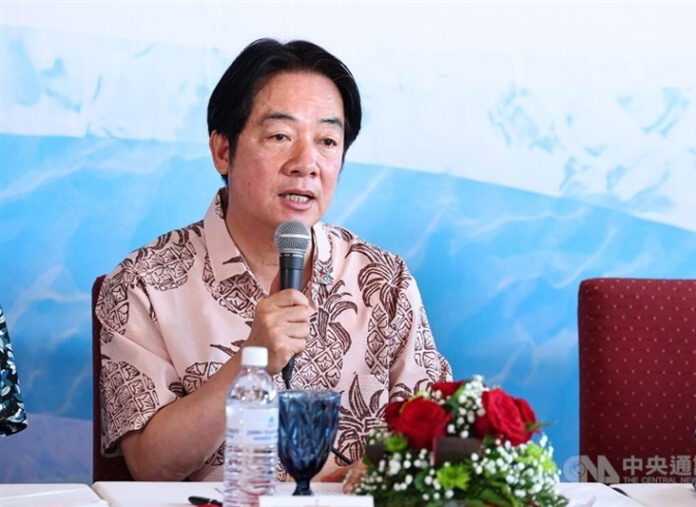Lai Ching-te Wraps Up South Pacific Tour, Advocates for Peace and Unity in the Face of Rising Tensions
President Lai Ching-te (賴清德) concluded his first overseas trip as Taiwan’s president on Friday, emphasizing the importance of democracy and regional security. His week-long South Pacific tour focused on strengthening Taiwan’s ties with its diplomatic allies in the Pacific while expressing concerns over escalating tensions in the Indo-Pacific region.
Speaking from Palau, the final stop of his tour, Lai addressed the growing instability in the region, highlighting recent developments that have sparked global concerns. Among these were North Korea’s involvement in the ongoing war in Ukraine and joint military exercises between China and Russia, both of which have been seen as destabilizing factors.
Calls for Peaceful Development and Regional Cooperation
At a press conference in Palau, Lai urged Beijing to return to a rule-based international order and contribute positively to regional peace and security. He stated that military drills and aggressive posturing would not earn China respect but would instead hinder cooperation among nations.
“The more nations gather for dangerous acts, the more united democratic countries shall be,” Lai declared. “Rather than raising their fists, [Beijing] should open their arms,” he added, emphasizing that dialogue and cooperation should be prioritized over military threats.
In his remarks, Lai stressed Taiwan’s commitment to engaging with the world and its right to have open exchanges with international communities. “The people of Taiwan have the right to engage with the world. Exchanges to foster greater understanding and cooperation should not be treated as an act of provocation by an authoritarian regime,” Lai stated, pushing back against Beijing’s criticisms of his diplomatic engagements.
Concerns Over China’s Potential Military Actions
During the tour, Lai also voiced concerns about possible military drills by China near Taiwan. Media reports have suggested that Beijing might use Lai’s overseas trip and his transit through U.S. territories as a pretext for increased military activities. Despite these concerns, Lai reaffirmed that Taiwan’s military was closely monitoring China’s movements in the Taiwan Strait and was fully prepared to respond to any threats.
Strengthening Taiwan’s Diplomatic Ties in the South Pacific
The primary focus of Lai’s tour was to bolster Taiwan’s relationships with its remaining diplomatic allies in the South Pacific. Taiwan has been under pressure from China, which has been actively attempting to sway Taiwan’s allies to sever diplomatic ties in favor of Beijing. In recent years, Taiwan has lost three of its Pacific allies—Solomon Islands, Kiribati, and Nauru—due to China’s growing influence.
However, Lai’s trip was seen as an effort to solidify Taiwan’s remaining alliances in the Pacific. The president visited Hawaii, the Marshall Islands, Tuvalu, and Guam, and met with key U.S. lawmakers and officials. These interactions further solidified Taiwan’s support from its international partners, especially the United States.
Engagement with U.S. Lawmakers
While in Hawaii and Guam, Lai had fruitful conversations with several prominent figures in U.S. politics, who expressed continued bipartisan support for Taiwan. Lai spoke with former U.S. House Speaker Nancy Pelosi, current House Speaker Mike Johnson, as well as Democratic House minority leader Hakeem Jeffries and Republican Senator Roger Wicker, who is expected to chair the Senate Committee on Armed Services next year.
“I feel confident that Taiwan’s international relationships with our friends are rock solid,” Lai said, recalling his discussions with U.S. lawmakers and officials from Taiwan’s American Institute in Taiwan (AIT) office in Washington.
Summary of Key Points
| Topic | Details |
|---|---|
| Tour Conclusion | Lai’s South Pacific tour concluded with a press conference in Palau on Friday. |
| Main Concern | Growing regional instability due to North Korea’s involvement in Ukraine and China-Russia drills. |
| Message to Beijing | Lai urged China to return to a rule-based international order and refrain from military escalation. |
| Military Preparedness | Taiwan’s military is closely monitoring the situation in the Taiwan Strait and remains prepared. |
| U.S. Engagement | Lai engaged with U.S. lawmakers, reinforcing Taiwan’s strong bipartisan support. |
| Diplomatic Focus | Strengthening relations with Taiwan’s remaining South Pacific allies and countering China’s influence. |
FAQ
Q1: What were the main objectives of Lai’s South Pacific tour?
A: The main objectives were to strengthen Taiwan’s relationships with its remaining diplomatic allies in the Pacific, raise awareness about regional security issues, and engage with U.S. lawmakers on Taiwan’s global standing.
Q2: What did Lai say about Beijing’s role in regional peace?
A: Lai called on Beijing to return to a rule-based international order and focus on peaceful development rather than military drills, stating that China’s aggressive actions only undermine its global respect.
Q3: What is Taiwan’s stance on military tensions in the region?
A: Taiwan remains vigilant about rising tensions, especially with China, but assures that its military is well-prepared to safeguard Taiwan’s sovereignty and security.
Q4: How did the U.S. respond to Lai’s tour?
A: Lai’s engagement with U.S. officials, including bipartisan support from Congress members like Nancy Pelosi and Mike Johnson, demonstrated strong U.S. backing for Taiwan.
Q5: How did Beijing react to Lai’s trip?
A: Beijing criticized Lai’s trip, especially his transit through U.S. territories, and suggested that Taiwan’s diplomatic engagements should not be treated as provocations.
